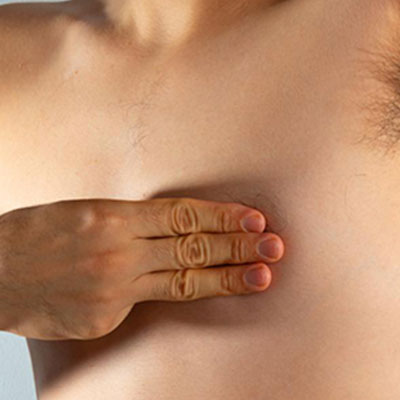Gynecomastia Treatment in Vijayawada
Gynecomastia is the benign enlargement of breast tissue in males, resulting in a breast size increase that can affect one or both sides. It is often caused by an imbalance between estrogen and testosterone levels, where excess estrogen or reduced testosterone stimulates breast tissue growth. Common causes include hormonal changes during puberty, which often resolve spontaneously, or aging, which can alter hormone levels. Other causes encompass certain medications such as anti-androgens, anabolic steroids, and some antidepressants, as well as health conditions like liver disease, kidney failure, tumors affecting hormone production, or thyroid disorders. Additionally, substance abuse like alcohol, marijuana, and heroin can contribute to gynecomastia. In some cases, the cause remains idiopathic, meaning no identifiable reason is found. The condition can be distressing but is usually benign; treatment depends on the underlying cause and may involve medication adjustments, hormone therapy, or surgical options such as liposuction or gland removal. Understanding these causes helps in diagnosing and managing gynecomastia effectively and Male breast reduction in Vijayawada , alleviating both physical discomfort and psychological concerns associated with the condition.

Treating gynecomastia:
Gynecomastia treatment by Best gynecomastia doctor in Vijayawada, which primarily involves medical, surgical, or hormonal approaches, can sometimes lead to other problems, though these are generally rare. Medical treatments like hormonal therapy may cause side effects such as hormonal imbalances, mood swings, or changes in libido. Surgical options, including liposuction or gland excision, carry risks like infection, bleeding, scarring, or asymmetry. In some cases, surgery might damage surrounding tissues or nerves, leading to nipple sensitivity changes. Additionally, if the underlying cause of gynecomastia isn’t addressed, recurrence is possible. It’s also important to consider that certain medications used to treat gynecomastia, such as tamoxifen or raloxifene, can have adverse effects like blood clots or gastrointestinal discomfort. Overall, while treatments are generally safe and effective, they carry potential risks that should be discussed thoroughly with a healthcare professional to minimize complications and ensure appropriate management tailored to the individual’s health status.
Tips to prevent it
Gynecomastia, the benign enlargement of male breast tissue, can often be prevented or minimized through various measures. Best hospital for gynecomastia in Vijayawada say that maintaining a healthy weight through balanced nutrition and regular exercise helps reduce excess fat that can contribute to breast enlargement. Limiting the use of substances known to cause hormonal imbalances—such as anabolic steroids, certain medications (like anti-androgens or some antidepressants), and recreational drugs—can also lower risk. Avoiding exposure to environmental endocrine disruptors found in some plastics and personal care products is advisable. Ensuring proper management of underlying health conditions like liver disease, hormonal disorders, or tumors, which can influence hormone levels, is crucial. In adolescents, gynecomastia often resolves spontaneously, but avoiding medications or substances that may exacerbate it can help. While not all cases are preventable—especially those linked to genetics or unavoidable medical conditions—adopting a healthy lifestyle, avoiding endocrine disruptors, and consulting Dr. S. L. Sravya for management of existing health issues at Esha Endocrine Centre are effective ways to reduce the likelihood of developing gynecomastia.
